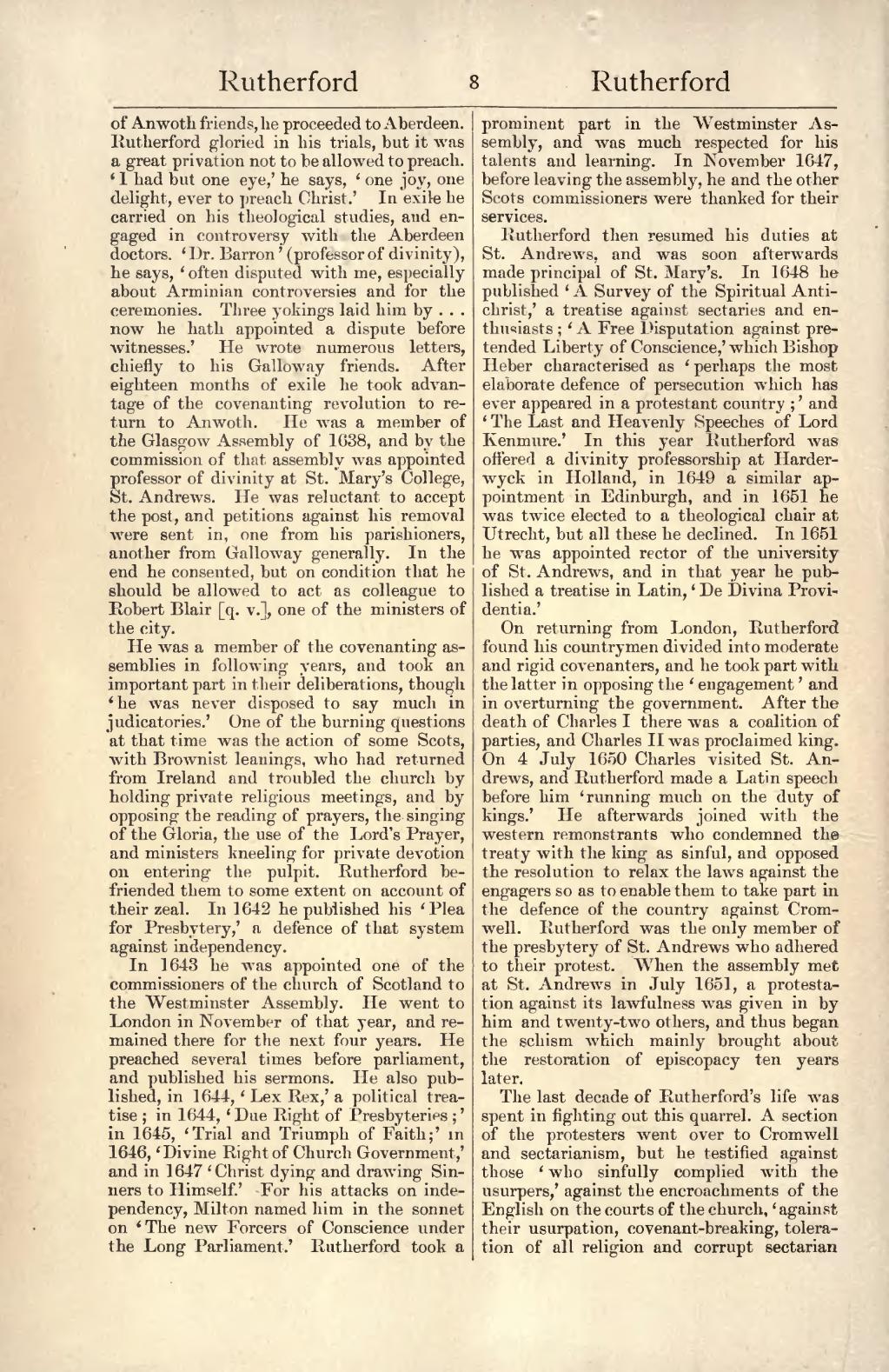of Anwoth friends, he proceeded to Aberdeen. Rutherford gloried in his trials, but it was a great privation not to be allowed to preach. ‘I had but one eye,’ he says, ‘one joy, one delight, ever to preach Christ.’ In exile he carried on his theological studies, and engaged in controversy with the Aberdeen doctors. ‘Dr. Barron’ (professor of divinity), he says, ‘often disputed with me, especially about Arminian controversies and for the ceremonies. Three yokings laid him by … now he hath appointed a dispute before witnesses.’ He wrote numerous letters, chiefly to his Galloway friends. After eighteen months of exile he took advantage of the covenanting revolution to return to Anwoth. He was a member of the Glasgow Assembly of 1638, and by the commission of that assembly was appointed professor of divinity at St. Mary's College, St. Andrews. He was reluctant to accept the post, and petitions against his removal were sent in, one from his parishioners, another from Galloway generally. In the end he consented, but on condition that he should be allowed to act as colleague to Robert Blair [q. v.], one of the ministers of the city.
He was a member of the covenanting assemblies in following years, and took an important part in their deliberations, though ‘he was never disposed to say much in judicatories.’ One of the burning questions at that time was the action of some Scots, with Brownist leanings, who had returned from Ireland and troubled the church by holding private religious meetings, and by opposing the reading of prayers, the singing of the Gloria, the use of the Lord's Prayer, and ministers kneeling for private devotion on entering the pulpit. Rutherford befriended them to some extent on account of their zeal. In 1642 he published his ‘Plea for Presbytery,’ a defence of that system against independency.
In 1643 he was appointed one of the commissioners of the church of Scotland to the Westminster Assembly. He went to London in November of that year, and remained there for the next four years. He preached several times before parliament, and published his sermons. He also published, in 1644, ‘Lex Rex,’ a political treatise; in 1644, ‘Due Right of Presbyteries;’ in 1645, ‘Trial and Triumph of Faith;’ in 1646, ‘Divine Right of Church Government,’ and in 1647 ‘Christ dying and drawing Sinners to Himself.’ For his attacks on independency, Milton named him in the sonnet on ‘The new Forcers of Conscience under the Long Parliament.’ Rutherford took a prominent part in the Westminster Assembly, and was much respected for his talents and learning. In November 1647, before leaving the assembly, he and the other Scots commissioners were thanked for their services.
Rutherford then resumed his duties at St. Andrews, and was soon afterwards made principal of St. Mary's. In 1648 he published ‘A Survey of the Spiritual Antichrist,’ a treatise against sectaries and enthusiasts; ‘A Free Disputation against pretended Liberty of Conscience,’ which Bishop Heber characterised as ‘perhaps the most elaborate defence of persecution which has ever appeared in a protestant country;’ and ‘The Last and Heavenly Speeches of Lord Kenmure.’ In this year Rutherford was offered a divinity professorship at Harderwyck in Holland, in 1649 a similar appointment in Edinburgh, and in 1651 he was twice elected to a theological chair at Utrecht, but all these he declined. In 1651 he was appointed rector of the university of St. Andrews, and in that year he published a treatise in Latin, ‘De Divina Providentia.’
On returning from London, Rutherford found his countrymen divided into moderate and rigid covenanters, and he took part with the latter in opposing the ‘engagement’ and in overturning the government. After the death of Charles I there was a coalition of parties, and Charles II was proclaimed king. On 4 July 1650 Charles visited St. Andrews, and Rutherford made a Latin speech before him ‘running much on the duty of kings.’ He afterwards joined with the western remonstrants who condemned the treaty with the king as sinful, and opposed the resolution to relax the laws against the engagers so as to enable them to take part in the defence of the country against Cromwell. Rutherford was the only member of the presbytery of St. Andrews who adhered to their protest. When the assembly met at St. Andrews in July 1651, a protestation against its lawfulness was given in by him and twenty-two others, and thus began the schism which mainly brought about the restoration of episcopacy ten years later.
The last decade of Rutherford's life was spent in fighting out this quarrel. A section of the protesters went over to Cromwell and sectarianism, but he testified against those ‘who sinfully complied with the usurpers,’ against the encroachments of the English on the courts of the church, ‘against their usurpation, covenant-breaking, toleration of all religion and corrupt sectarian
